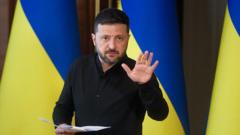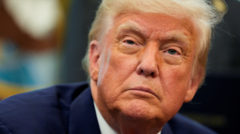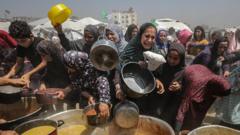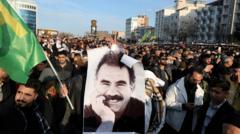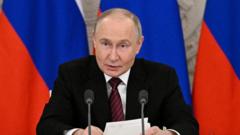The disbanding of the PKK, a group with a long history of conflict against the Turkish state, raises questions about the implications for peace and Kurdish rights.
**Uncertain Future After PKK's Historic Decision to Disband**
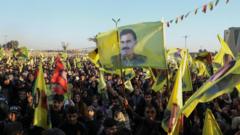
**Uncertain Future After PKK's Historic Decision to Disband**
As the PKK announces its disarmament, mixed feelings of optimism and doubt emerge within Turkey’s Kurdish community.
In a surprising turn of events, the Kurdistan Workers' Party (PKK) has announced its decision to disband, marking a potential end to a 40-year conflict that has claimed around 40,000 lives. This historic step follows a call from PKK leader Abdullah Ocalan for the group to disarm, but reactions are varied and filled with both skepticism and cautious hope.
As the ruling party in Turkey praises this move as a step towards a safer nation, many Kurds express doubt about the government’s commitment to ensuring their rights. "They have been tricking us for thousands of years," says Necmettin Bilmez, a local driver, casting a shadow of mistrust over the government's intentions. Another resident, Mehmet Ek, recalls the toll of the conflict on both sides, emphasizing the need for peace and an amnesty for PKK fighters to facilitate reconciliation.
The mood in Diyarbakir, a predominantly Kurdish city significantly impacted by the conflict, is muted. Locals hope for peace but are wary, aware of the scars left on their community. Ibrahim Nazlican, for instance, reflects on the futility of the prolonged conflict, stating, "There are no winners."
Calls for the release of Ocalan, who has been imprisoned for decades, echo throughout the community, where many believe his freedom is pivotal for lasting peace. Menice, who has lost several family members to the conflict, insists that the release of Ocalan would signify a chance for real change.
Observers speculate that the intricate political dynamics, including Erdogan’s need for Kurdish political support ahead of the 2028 elections, might motivate genuine negotiations. With the Kurdish conflict increasingly strained by regional shifts and the military pressure on the PKK, now could be a crucial moment for both sides to reach an understanding. Nonetheless, the path forward remains uncertain as many still bear the heavy scars of years of violence and loss.
As the ruling party in Turkey praises this move as a step towards a safer nation, many Kurds express doubt about the government’s commitment to ensuring their rights. "They have been tricking us for thousands of years," says Necmettin Bilmez, a local driver, casting a shadow of mistrust over the government's intentions. Another resident, Mehmet Ek, recalls the toll of the conflict on both sides, emphasizing the need for peace and an amnesty for PKK fighters to facilitate reconciliation.
The mood in Diyarbakir, a predominantly Kurdish city significantly impacted by the conflict, is muted. Locals hope for peace but are wary, aware of the scars left on their community. Ibrahim Nazlican, for instance, reflects on the futility of the prolonged conflict, stating, "There are no winners."
Calls for the release of Ocalan, who has been imprisoned for decades, echo throughout the community, where many believe his freedom is pivotal for lasting peace. Menice, who has lost several family members to the conflict, insists that the release of Ocalan would signify a chance for real change.
Observers speculate that the intricate political dynamics, including Erdogan’s need for Kurdish political support ahead of the 2028 elections, might motivate genuine negotiations. With the Kurdish conflict increasingly strained by regional shifts and the military pressure on the PKK, now could be a crucial moment for both sides to reach an understanding. Nonetheless, the path forward remains uncertain as many still bear the heavy scars of years of violence and loss.

